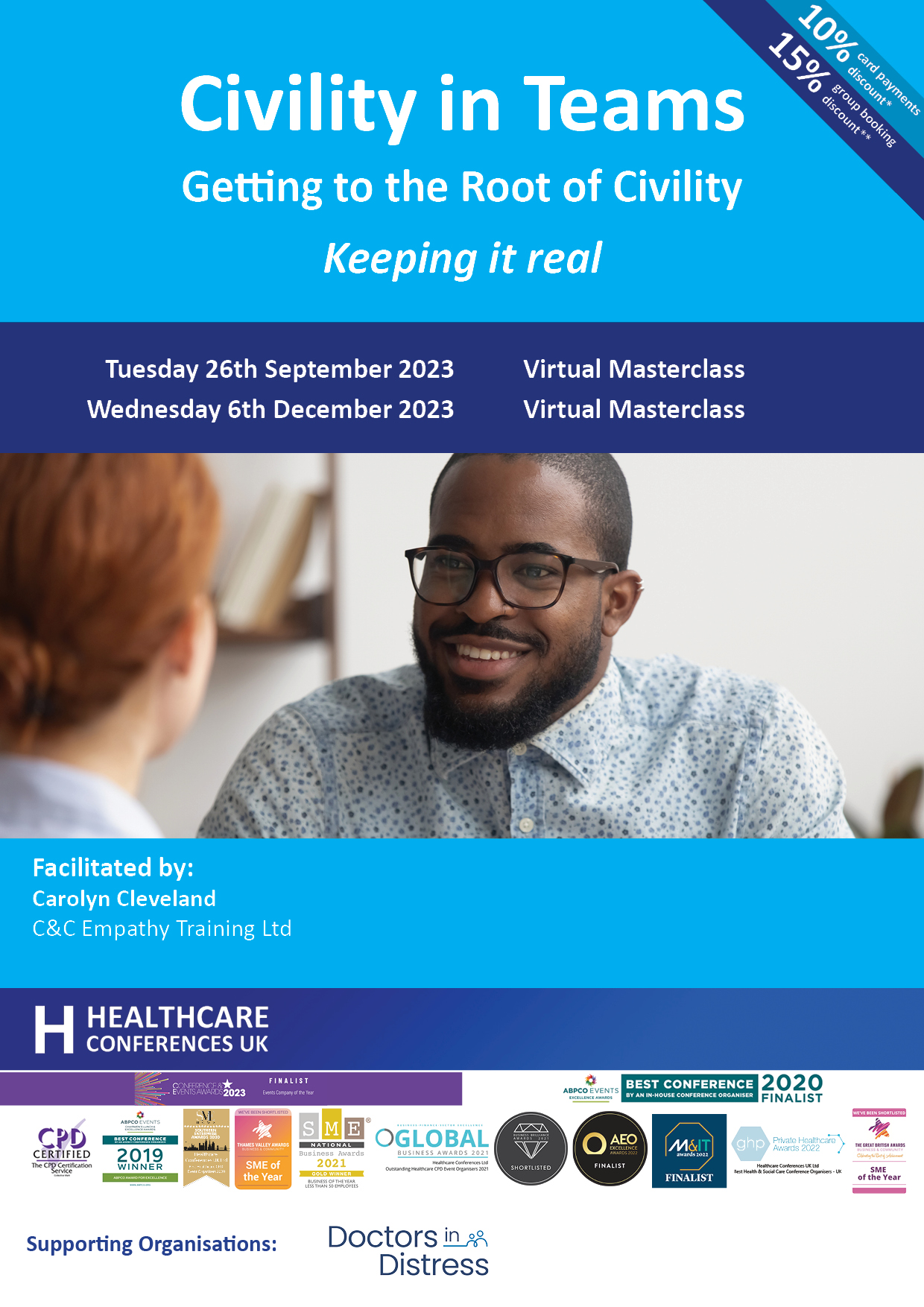Find out more about virtual attendance
OUTLINE
This course will explore civility, the impact of it being present and the impact of it not being. But beyond that, it will be digging deeper to the root cause of incivility and how empathy, emotional awareness and well-being are the main foundations to creating civility on an individual level and how a teams can create civility within their team culture and for those who use their services.
Civility and the consequences of incivility are embedded in many frameworks and policies: PSIRF for compassionately engaging with patients, staff and colleagues. Duty of Candour, in preventing prolonged psychological harm, being open and transparent, as well as multiple policies on respect, dignity and inclusion, yet incivility happens at a very high rate, causing harm to workforce, colleagues, patients, loved ones and even life. Connecting new knowledge with emotions can really support long term learning, which as important part of this masterclass.
Knowing the true impact of a lack of civility and recognising how empathy sits at the core of creating civility, can really support self-reflection, and motivation to create an environment that provides respect, support, honesty and learning.
It is well known statistic that people who even just witness incivility towards another are 50% less likely to help another person. (Civility Saves Lives)
Often, we avoid visiting difficult emotions in others, as well as ourselves, because we don’t feel confident, or skilled. We are feeling hurt by another’s incivility to us, or, we simply don’t have the emotional reserves. Understanding the emotional component, understanding the story, remembering our human commonality and vulnerabilities are all important to recognize. Bringing the human focus for colleagues, patients, loved ones, to enable authentic learning around civility.
In a supportive and relaxed environment, delegates, will have the opportunity to gain in depth knowledge of the emotional component, relate to, analyse, realise the significance of civility and belief in their own abilities, but in creating practices that make positive culture changes in organisations.
WHO SHOULD ATTEND
All healthcare professionals wanting to understand on a deeper level, the importance of civility, the impact on it when it is not present and how a civil and psychological safe culture can be supported.
KEY LEARNING OBJECTIVES
- Feel, analyse, and explore the presence and absence of civility within life, trauma, and a healthcare incident and how the ‘Funnel of Life’ can impact on our ability to engage.
- Seeing perspectives and understanding emotional motivations and the emotional component recognising vulnerability in others and self.
- Seeing the bigger picture and having an enquiring mind to understand the story and the courage to recognise our own behaviours and reactions.
- Build confidence in the positive impact of civility and really being authentically interested in the emotional component to be able to create an optimum outcome in often a less than optimum situation.
- Explore and have a good grasp of how internal unconscious belief systems, can link through to the outcomes we achieve. We know what works with compassionate engagement, but why do we so often struggle?
- Realise the significance of authenticity rather than feeling fearful of not doing things perfectly. Examine where can we get emotional information from to support us, even if we are not aware we are doing it!
- Identify the importance using an enquiring mind and a hypothesis as we try and understand the story that we are aiming to compassionately engage with.
- Develop awareness on personal wellbeing and resilience. How can we reframe things to support personal psychological well and the importance of humour.
FACILITATOR
Carolyn, has a background in psychology and counselling, specialising in loss, fear and vulnerability, and conceived C&C Empathy Training from her study and personal experiences of adversity within life, trauma, healthcare incidents, and vulnerability.
Carolyn experienced the loss of a child in a healthcare incident and found many individuals and organisations struggled with civility particularly when managing their own stress and fear, causing harm rather than understand the lived emotional experience, motivations and needs, impacting on psychological safety. Carolyn works with several healthcare trusts, NHS England, public and private organisations, legal firms, and whose work has the endorsement of the former Chief Coroner following her work on the National Coroner’s Officers Training Programme 2019.
At the core of Carolyn’s work, is her thought-provoking experience, told with honesty and candour, along with humour. This is joined together with her academic study, analysis and her personality, and belief that understanding ‘why’ something needs doing, rather than just ‘what’ needs doing, is vital and supportive in long term positive change for and staff wellbeing and ultimately patients.



